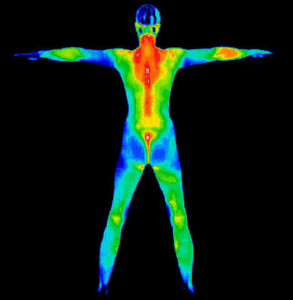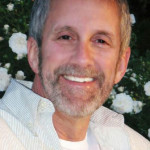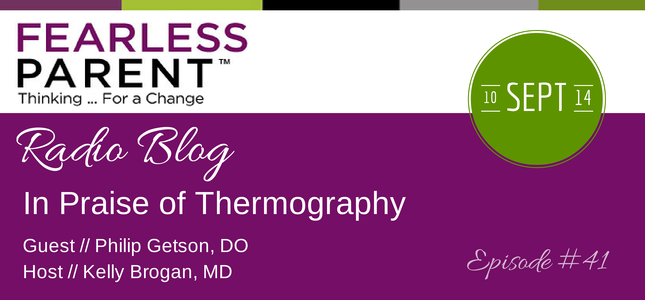 Breast cancer is shockingly prevalent, affecting 1 in 8 U.S. women. Millions of women trust mammography and schedule their scans religiously. But there are risks and the chorus of dissidents is expanding. If you want to learn about a screening alternative, listen to this show in praise of thermography.
Breast cancer is shockingly prevalent, affecting 1 in 8 U.S. women. Millions of women trust mammography and schedule their scans religiously. But there are risks and the chorus of dissidents is expanding. If you want to learn about a screening alternative, listen to this show in praise of thermography.
We are living in an era of chronic disease brought on by environmental exposures. Our genes may load the gun, but our lifestyles are certainly pulling the trigger. Mainstream medicine has yet to truly acknowledge the role of diet, stress, and environmental toxins in health and disease.
After 30 years of increasingly aggressive screening and treatment, the goal of decreased breast cancer mortality has not been realized, according to prestigious journals and even conventional regulatory agencies.
If our current methods of detection are themselves carcinogenic, and lead to overdiagnosis and overtreatment, what alternatives do we have?
Join me in a discussion with Philip Getson, DO, family physician and board-certified thermologist, to explore the myths and facts surrounding thermography and its potential to fill this void in women’s health:
- What is thermography and how does it work?
- Why might it be a good choice for cancer screening?
- Are there reasons not to use thermography?
- Do we know enough about what cancer really is yet?
- Beyond breast cancer, what are some other applications?
- When should women begin screening, and how frequently?
If you have other questions you’d like us to address, include them as a reply to this blog post and we’ll address them on air!
In this YouTube clip, internationally-known author and women’s health pioneer Christiane Northrup, MD recommends thermography over mammography and calls Phil “one of the leading researchers in the proper use of thermography.”
 Philip Getson, DO is a board certified physician in practice in NJ since 1976. He is an internationally-recognized expert in the diagnosis and treatment of Reflex Sympathetic Dystrophy/Complex Regional Pain Syndrome. Philip is an Assistant Professor of Medicine in Neurology at Drexel University Hospital. As a board certified thermologist certified by four thermographic boards, he has reviewed over ten thousand thermographic studies of the breast, thyroid, and neuromuscular system. Philip is Vice President of the American Academy of Thermology. He currently serves as the medical liaison to the New Jersey Department of Health to implement the Governor’s bill for RSD Awareness.
Philip Getson, DO is a board certified physician in practice in NJ since 1976. He is an internationally-recognized expert in the diagnosis and treatment of Reflex Sympathetic Dystrophy/Complex Regional Pain Syndrome. Philip is an Assistant Professor of Medicine in Neurology at Drexel University Hospital. As a board certified thermologist certified by four thermographic boards, he has reviewed over ten thousand thermographic studies of the breast, thyroid, and neuromuscular system. Philip is Vice President of the American Academy of Thermology. He currently serves as the medical liaison to the New Jersey Department of Health to implement the Governor’s bill for RSD Awareness.













I get an annual thermogram. The interpretations are always intermediate and recommend a mammogram (TH3 & TH3-). My healthcare provider does not think that tells her anything and would rather I have a mammogram annually, which I do not wish to do. As long as my thermograms are stable, is this enough? She is not happy with my decision to skip the yearly mammograms and this is a bone of contention between us.
Studies have suggested that a “normal” thermogram may well be the best indicator of a lack of breast disease. This being said, the decision to have a mammogram is a personal one. Given the most recent medical statistics one has to wonder whether a normal mammogram is in fact truly “normal”
Fantastic conversation! I have had 3 thermograms and love the freedom of not having mammograms. Thank you for this wonderful information!
Dr. Getson, I have a relative who suffers with RSD. He was diagnosed many years ago,and has been treated with many therapies. I just heard he is addicted to heroin, so we don’t know how to help him. He was an engineer and had a great job and life. He has struggled to get off of pain meds and now he is in the deepest part of his life. We are in Florida. Do you know of any therapy that can help him with RSD? This will have to wait until the addiction is recovered. It made me hopeful to hear that you know about this. Thank you, Dawn
Dear Dawn:
There are many new ways to treat RSD and many doctors around the country equipped to do so. I am sorry to hear of your relative’s plight. I wish him well and would be happy to speak with you to refer you to someone who can help him with the RSD. Please feel free to call my office @ 856-983-7246 for that information
Even though I’ve been doing thermography instead of mammograms for several years now, I learned a lot from this show. I never knew about the connection between dental problems and thyroid. I was also amazed that Dr. Getson saw positive changes in one patient’s thermography after just two weeks of improved diet and reduced exposure to toxins. I believe mammograms may have played a role in my own breast cancer, and in fact, a mammogram did not even detect it. Two months after a mammogram showed nothing, a sonogram showed a 1 centimeter tumor. So I get thermography and sonograms now – only.
I would be intereted in Dr. Getson’s opinion of sonograms, if he’s still monitoring these comments.
Sonograms or ultrasounds as they are sometimes called are tests where the breast is anatomically imaged using sound waves. There is no compression or radiation and it is completely safe. Its benefit is to differentiate solid from cystic masses and it does so very well in the event of a palpable finding. It is a great test for that. It is not a good test as a general screening modality of the entire breasts however. We recommend it frequently in conjunction with thermograms to assist in providing more information. A word of caution. The mammography centers would have you believe that you MUST have a mammogram to be allowed to have a sonogram. There is no such rule. It is just another tactic to coerce women into more mammograms